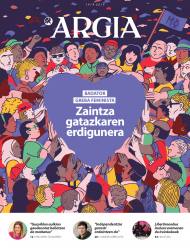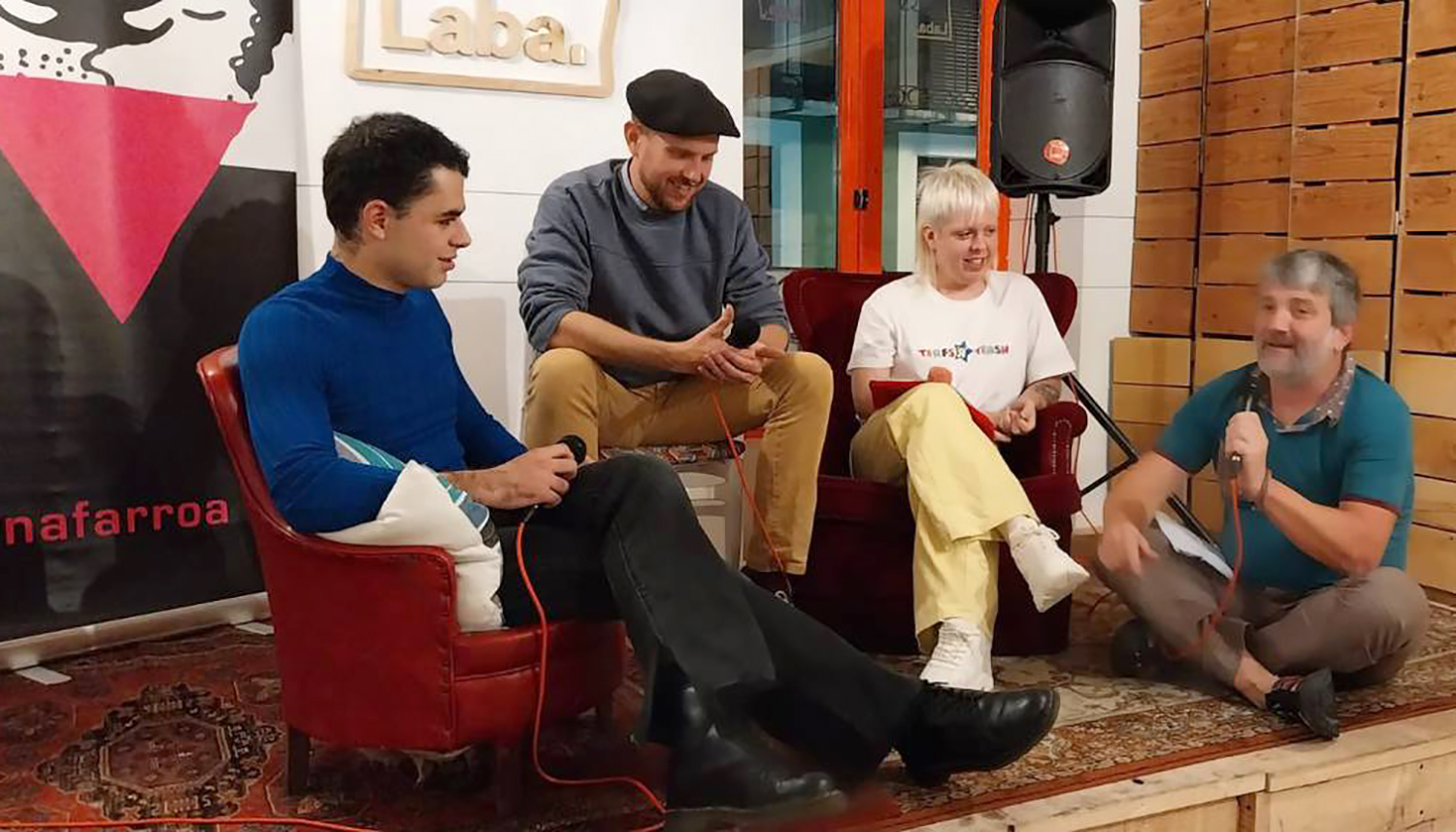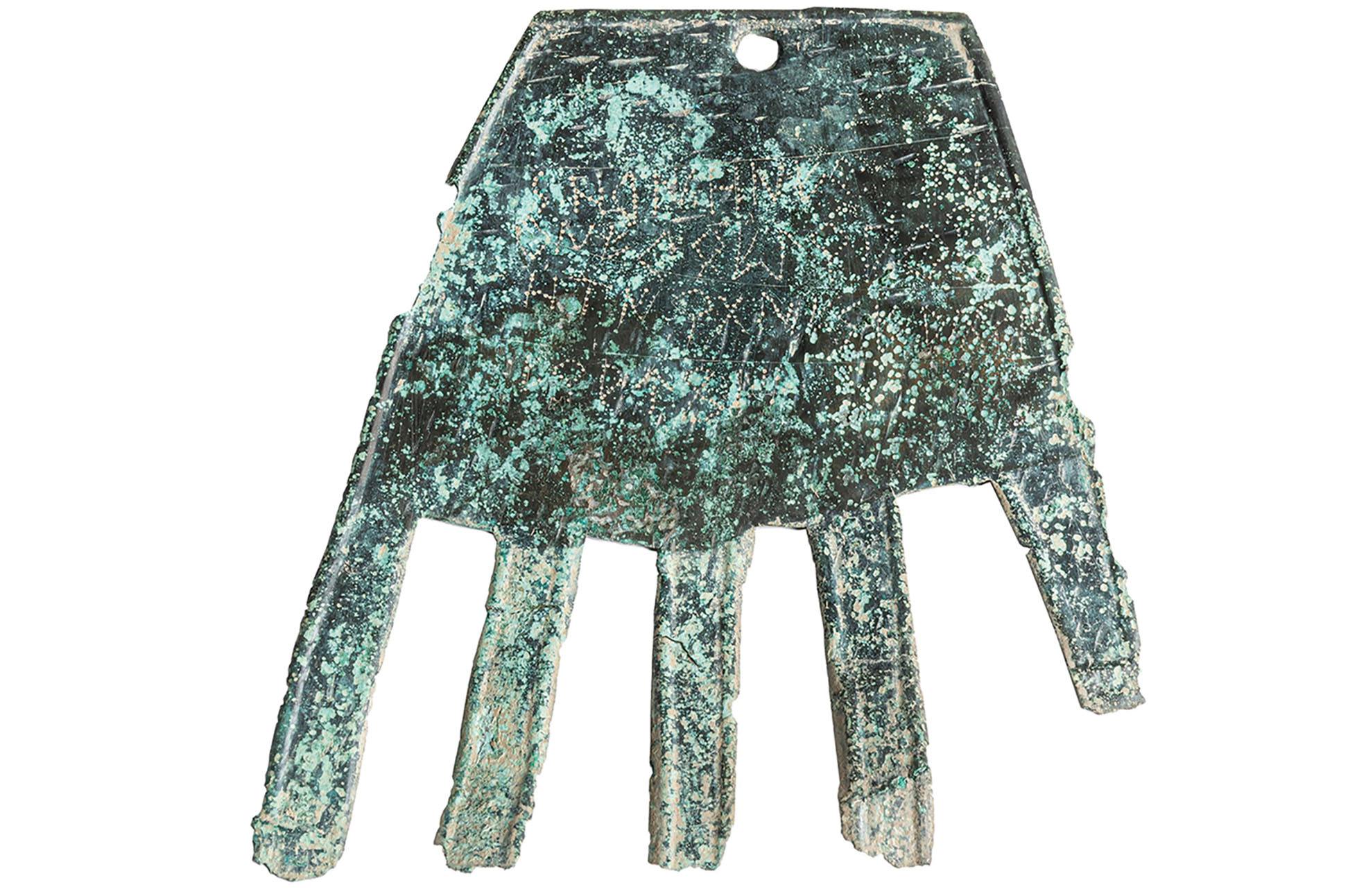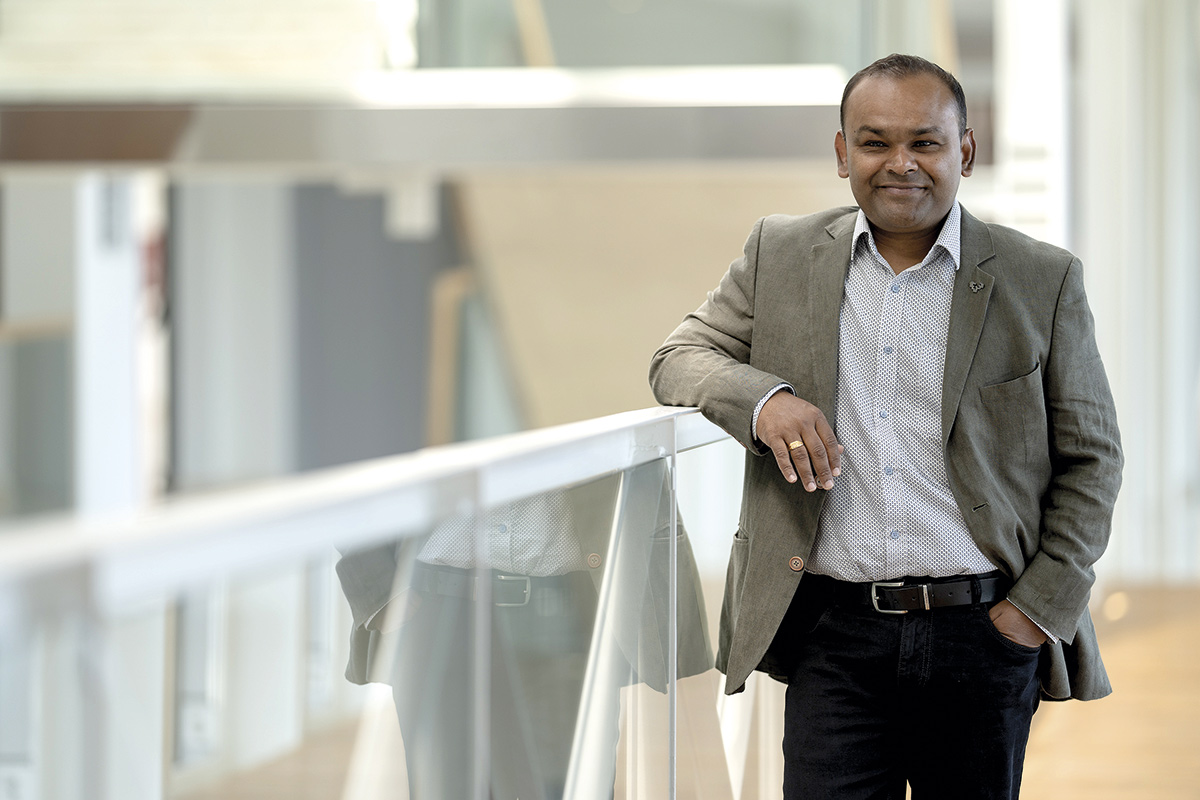Tribute to language from the eyes of science
- In 2019 it is 50 years since the Diputación de Navarra published the first issue of the scientific journal Fontes Linguae Vasconum. It has been a reference tool, decades after decade, to learn about the novelties related to research in Basque. In recent times, it has made a special effort to adapt academic journals to the internationally required parameters and to respond to the needs of young researchers. That was precisely the great challenge of Ekaitz Santazilia Salvador, a young Pamplona linguist who has been leading the leadership for two years. To celebrate the anniversary, an exhibition and an international congress have been organized to celebrate the anniversary.
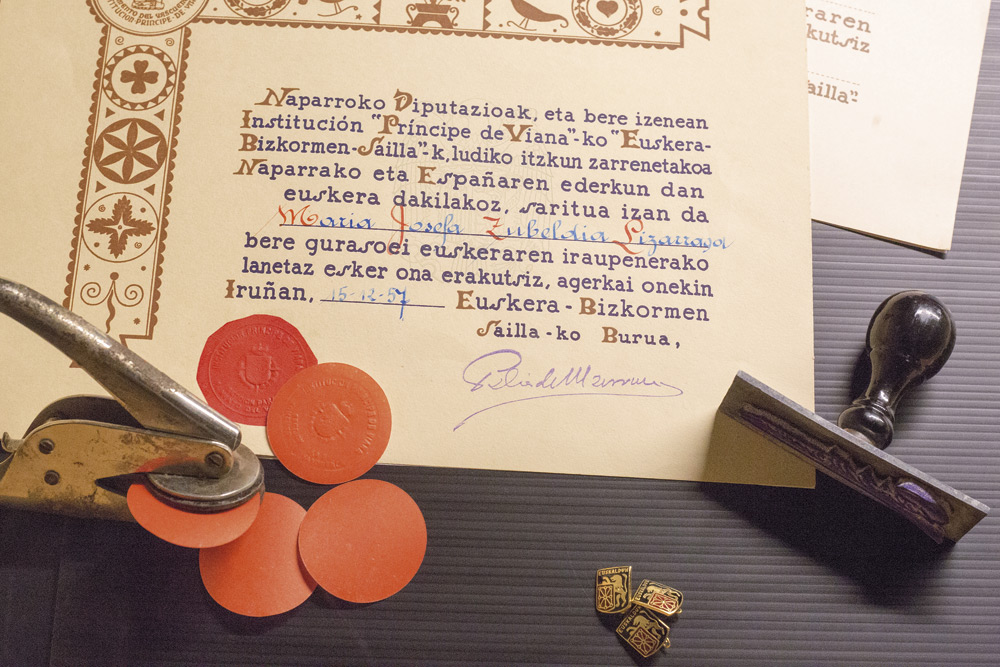
How did a magazine like that emerge in the final straight of Franco?
The Prince of Viana Institution of the Provincial Council of Navarra launched this scientific journal with the aim of publicizing the latest research on the Basque Country. The Sakandarra ethnographer Jose Mari Satrustegi was for years the soul of the magazine. He told how José Esteban Uranga, then director of the institution, went to Urdián to talk about an editorial project that would collect the results of the Etniker research. By then, Satrustegi had been working for two years in the Euskera Department of the Prince of Viana Institution.
What was that?
The Provincial Council created the section in 1957 with the aim of giving impetus to the Basque country. At the head of it, Pedro Díez de Ulzurrun was a well-known doctor, and with the help of the activists who gathered in it very interesting initiatives were carried out, giving continuity to the Basque movement before the war: the bertsolaris championships were resumed suspended, aids were given to the first ikastolas, Euskera classes were organized in the first Basque national awards,
Therefore, did the Provincial Council reward speaking in Basque?
Yes, it was. In some years, some 6,000 children were screened by village. In the Navarre Savings Fund, cards were opened for children of up to 200 pesetas and, in addition, children were rewarded financially, as well as priests and teachers working for the Basque Country. It was a very important initiative for the prestige of the euskera.El Franco
was quite peculiar in Navarre and, of course, within the Francoist Government there were also people with sensitivity towards the Basque country, without being abertzale.
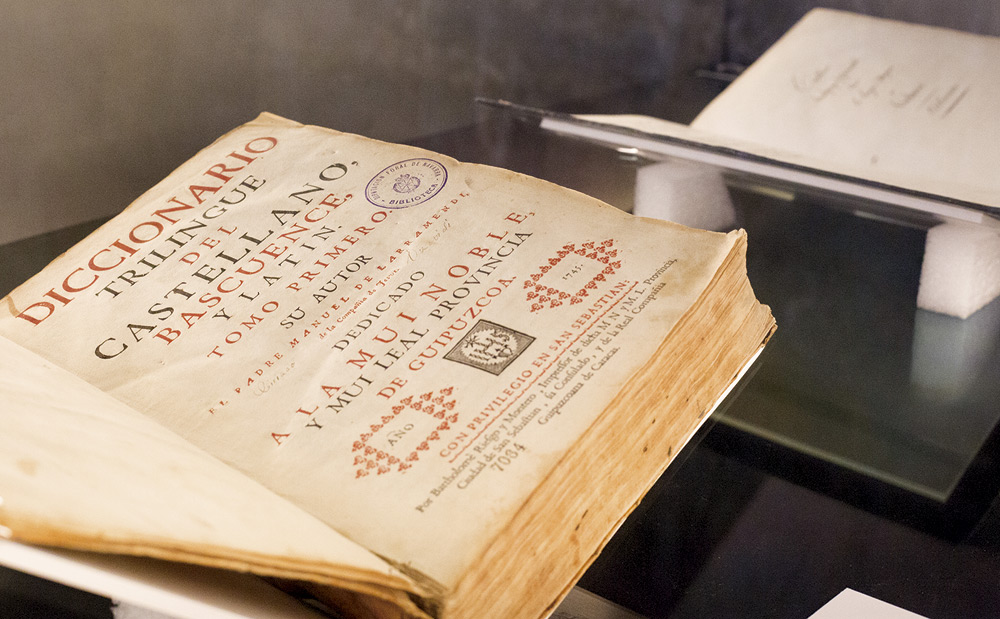
What has been the topic of 'Fontes' in these years?
Satrustegi realized right away that Uranga spoke more about linguistic issues than about ethnographic research, and proposed adding the subtitle Studia et documententa, in order to publish not only research papers on language, but also ancient texts, to make this corpus known. Satrustegi himself had enough material to feed the journal in this field and they started it.
At the same time, a new ethnographic journal was created: Notebooks on ethnology and ethnography of Navarra.
How has the magazine been renewed in recent years?
Fontes, Príncipe de Viana, Cuadernos de Etnología y Etnografía de Navarra and Cuadernos de Arqueología are the four academic journals published by the Government of Navarra. The Government of Navarra has chosen to maintain and strengthen them, and although they cannot compete with the large international journals and operate with less resources, the fact that they are "small" has its advantages. We publish faster, publications are free for authors, all articles are available to anyone...
At Fontes we took three numbers a year and now we pulled two. In addition, we are formally meeting the possible requirements, so we are entering several databases. That leads to a rise in classification. This means that the publication here is useful for authors to complete their curricula. We have also extended the subjects: In Fontes, dialectology, philology or the history of the Basque country have been common topics, but in addition to that, we must take into account what the young Basques currently investigate and Fontes must help them.
The review system has been adapted. All articles require favorable reports from two specialists, as is usual in scientific journals. We just walk to fill out the journal and the fact that an article is rejected can be a problem. It's a hard process and it's also not nice to have to say no to a acquaintance. Young people are used to it, but old school people don't have a habit.
Academic drafting councils have also been renewed. More women have joined other universities, in addition to the UPNA and the UPV/EHU, we have faculty from the universities of Baiona and Illinois.
You've also made the digital leap.
Yes. We have changed the paper format, the websites have also been renewed and now all the articles are on the Internet. The Prince of Viana Institution makes available to all contents of its journals, from the moment they are published, unlimited online access under a Creative Commons license. Given that they are made with public money, we consider it essential that journals can be consulted for free.
I am in favour of strengthening the digital, but maintaining the role, among other things because tangibility is important, also in terms of conservation. In rankings, it's different if it's just a digital journal or not.
Euskaltzale environment

"The public initiatives that were put in place to promote and investigate Euskera under Franco are very unknown and saying that it was banned directly from Euskera is too simplistic. All that came from nationalism was rejected, including the vision or project about the Basque who was in this environment, but not directly from the Basque. Therefore, outside the Abertzale environment there were also initiatives. In the 1950s, the University of Salamanca created the Euskera chair and the Provincial Council of Gipuzkoa launched the Julio Urkixo seminar; in the 1960s, another chair was opened at the University of Navarra. In this context, the Euskera Department was set up in 1957 and it has to be said that when they were going to give the prizes, it was often the people's own Basques who did not understand the initiative. By then, many parents already preferred that children learn Spanish well and forget about the Basque".
What is it and what is not "Fontes"?
Ekaitz Santazilia, Director of Fontes: "Fontes is not a news journal, it is a scientific journal. It must be based on university research, but it must not detract from the contribution that people from other training have made in these 50 years. At the time, Satrustegi himself, Ondarra, Aingeru Irigarai… did a great job of feeding Fontes and they have to be honored. Even today, we do not want to leave out these types of researchers, who are not linguists by training. Balance must be sought.
In addition, we wanted to expand the journal's agenda. I believe it is essential to extend it to all areas of linguistics: sociolinguistics, didactics, literature, typology, neurolinguistics… Whenever we are dealing with studies related to Euskera, of course.
Exhibition “Fontes Linguae Vasconum, paper treasures”
In the Archive of Navarra, from February 15 until the end of March
They
have shown important documents and old texts that are kept in the Archive of Navarra and elsewhere, all of them original. According to the organizers, they have never been so together. From the point of view of the philologist, the organizers want to explain why they are valuable for the history of the Basque country.
Since the creation of the journal Fontes linguae vasconum, the documents, photographs, diplomas… of the Euskera exams organized by the Department of Defense of the Basque Country were kept. You can see them in the exhibition.
The oldest texts are as follows: The Card of Leire, the letters of Martin de San Martin and Matxin de Zalba, the translation of the new Testament of Joanes Leizarraga, the epitaph of Joan Atzx, the manuscript of Lazarraga, Pedro Agerre 'Axularren' Gero, the map of Bonaparte, a doctrine in Roncalés.
The Basque of the cultured fields in the music video
During the Renaissance, a video will be recorded showing that the higher-level people also used Euskera.
It's a project by the linguists of the Aziti Bihia association, in collaboration with the Kideka music association. The Basque epitaph of Pamplona Joan Atzx of the 16th century has been adapted with Renaissance music and a video clip has been recorded in the monastery of Iratxe. It will be broadcast on the Internet. They want to claim that Euskera was also used in cultured contexts, although normally only orally. In this sense, they have stressed that the Basque country does not necessarily have to be linked to popular music or to the rural environment.
New methods and trends in linguistics (Basque)
International Congress on 6 and 7 March
The
congress, organized by Euskarabidea, has two objectives: to know the latest results obtained in different fields of research on Euskera and to know new methods and tools applicable to research in Euskera.
In addition to three plenary conferences, nine thematic seminars have been organized. Lyle Campbell will be the professor at the University of Hawaii. He specializes in language typologies and has been invited to present other methodologies that may be of interest to Basque research. Lola Pons is a professor at the University of Seville, an expert in Spanish history and very good in dissemination, according to the organizers. Joaquín Gorrochategui will also be present, as defined by Ekaitz Santazilia, director of the scientific journal Fontes: "He worked for many years with [Koldo] Mitxelena. He knows Fontes very well and is an excellent Indo-European.
The following experts shall conduct two seminars: Blanca Urgell, Mari Jose Olaziregi, Ibon Manterola, Iván Igartua, Iñaki Camino and Joseba A. Lakarra. Esti Amorrortu of the University of Deusto, Aritz Irurtzun of the Université de Pau et des Pays de l’Adour and Céline Mounole and Patxi Salaberri Zaratiegi of the UPNA. Over 70 linguists will meet at these seminars.
We are seeing more and more spelling errors in the writings of social networks, not only of young people, but also of the media. Some have become so common that they hardly hurt their eyes.
In this way, we can read in Spanish many things like: "You lose a dog," "It'll be that or k... [+]
Euskaltzaindia's motto is "ekin eta jarrai" ("ekin eta jarrai"), the outlawing of Euskaltzaindia. I don't know why the Academy wasn't outlawed, all three words appeared on its logo. The allegations have been made with less - and (those of one age remember the cassette of The Mondragon... [+]
Euskararen biziberritzea Ipar Euskal Herrian jardunaldia antolatzen du ostiral honetan Baionan Euskaltzaindiak. Euskararen alde egiten dena eta ez dena eztabaidatzeko mementoa izango da. Eragileak eta politikariak bilduko dira egun osoan.
In a one-hour commute to the workplace, I am accompanied by the car radio. On yesterday's journey, I had the opportunity to enjoy a short story program, as the last port of the road, full of curves, began in Karrantza. Short legends, yes, of few words, but stories of great... [+]









